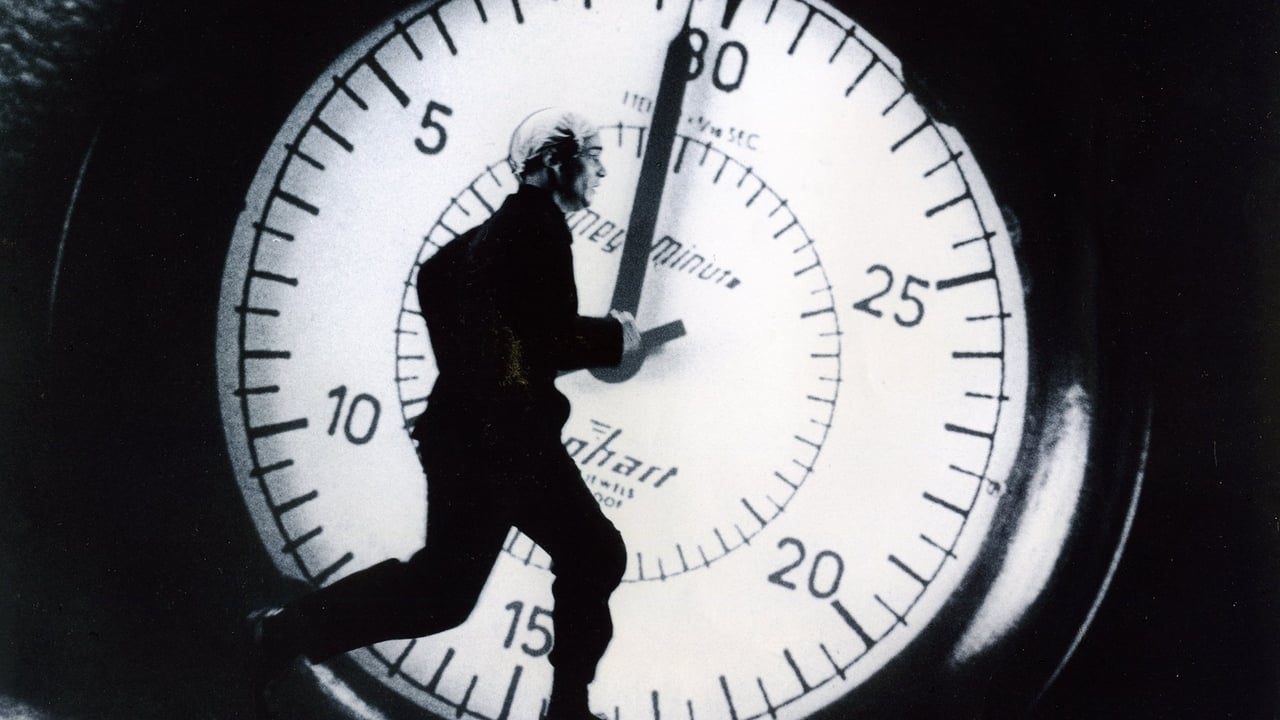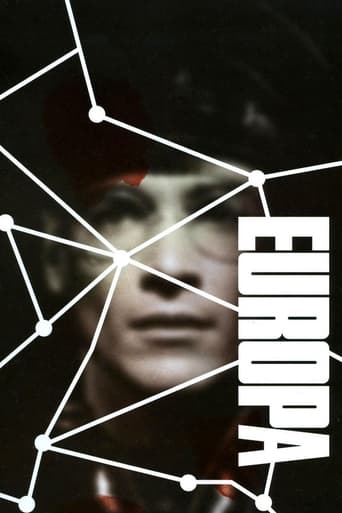



Instant Favorite.
Good concept, poorly executed.
a film so unique, intoxicating and bizarre that it not only demands another viewing, but is also forgivable as a satirical comedy where the jokes eventually take the back seat.
View MoreAmazing worth wacthing. So good. Biased but well made with many good points.
View MoreLars Von Trier's Europa, also known as Zentropa, is a movie that essentially deals with memories and trauma. This film is unique in its approach because it follows a multi-layered treatment of elements like time and space, as events that transpire in the film seem to be part of certain distinct time frames. The time frames conspicuously deal with supposedly three different generations, but ultimately amalgamate into one coherent happening. It is the story of an American who gets offered a job at the Zentropa railway network by his German uncle. The events happen in the backdrop of post Nazi-Germany, but the narrative structure follows an uncanny rendition of post war sentiments and post war trauma. The protagonist's encounter with various memories and traumatic incidents are actually a backward projection of his own life's happenings, which is reminiscent of the film's visual style and treatment. Hence, the constant visual references make vociferous impact because of the plain fact that it so unmistakeably mimics the premise of the film in question. The film also deals with topics like love, sympathizers of German wartime decisions and sensibilities, especially WW2; and specifically also those who vehemently stood against it. Therefore, we see the protagonist's mind and ideologies being challenged by two groups which are polar opposites of each other, namely, the American mercenaries and the residual entrée of post Nazi sympathizers. The protagonist is at loggerheads constantly, as he is seen in a fix when it comes to making or taking decisions involving those that question his mind. He is also seen struggling to take sides as his moral obligations lie with both his original fatherland and adopted motherland. As succinctly put by Lars Von Trier in this brilliant piece of art, we see not just the protagonist, but also many other central characters, like those of his lover struggling to take a stand as they are very strongly bogged down by various moral and intellectual standoffs, which clearly arise from differing points of view and differing ideologies. The characters of the imposing lover and her father are important as they are in close quarters with the protagonist and ultimately play an important role in the protagonist's sense of understanding the moral and social obligations that shape his psyche and reduce him to a wreck psychologically. All the conflicts in this film are a precursor to the complicated flow of thought processes that the protagonist is involved in; which eventually lead to his demise. The treatment of time and memories is unique as it is not on unilateral grounds; very much in tune with the protagonist vis-a-vis his mind's internal conflicts and issues.The dilemma that the characters face, where they are facing constant conflicts of gargantuan proportions, is proof of the fact that the mind is the master. It is the human mind that calls all the shots, as is seen in distinct sections of Max Von Sydow's voice-overs, where he is playing the role of the guide who drives the mind to deep sleep, devoid of all internal and external conflicts that the world has to offer.The shot-taking and editing pattern of the film are complementary to the thematic influence of the film, which also epitomizes the superficial nature of human relationships, pretty much outlined by the absurdity of the feeble nature of one's mind, as is seen in the case of the female who instigates the murder of her own father, in spite of the fact that she is deeply in love with her father. Hence, a lot of emphasis is laid on the absurdities of the mind and its associative thought processes, which finally underlines the crux of what the film is all about, of course in the looming shadows of time and space and its apparent lack of disparity.Every frame in this film tries to weave a story. Lars Von Trier's formalist approach in terms of portrayal of memories and trauma is evident from his shot-taking. The realist approach juxtaposed with dream sequences and surreal representations of time and space are the unique features of this film. To sum it up, this film clearly deals with a character who starts out as an idealist, is forced to take sides against his own wishes, falls prey to the ambiguities and fallacies of the mind and its complicated set of ideals and what those specific ideals stand for and emote.
View MoreIn 1995, Lars von Trier and Thomas Vinterberg created what is known as the 'Dogma 95 Manifesto'--a series of rules that these and other Danish avant-garde film makers would adhere to the in the future. I mention this because although "Europa" was made by von Trier, the film does not at all adhere to these rules--as the film was made four years before this film movement was deliberately created. Von Trier's use of black & white film (interposed throughout the film with muted color), sets, incidental music, non-hand held camera, the use of a crane for a few shots and setting the film in the past were all techniques he would eschew only four years later. I guess he was just getting it out of his system! The beginning of "Europa" is very, very strange. You hear the voice of Max Von Sydow and he leads the audience in a hypnotic induction--taking you back to the year 1945--just after WWII. And, later, you will once again hear the voice of Von Sydow talking throughout the film like a hypnotherapist--a VERY unusual way to narrate this film.The film plot revolves around an odd and rather non-emotive American, Leopold Kessler. It seems that he was a pacifist during the war and has moved to Germany to work for the railroad. This is odd, I know, but it gets a lot more unusual than that... I would try to explain the story, but frankly it all becomes very surreal and a bit weird. Additionally, while the film is supposed to be about a group of post-war terrorists named 'Werewolves', the film does NOT attempt to provide an actual history lesson or really discuss their actions. My advice is like all surreal films, don't try to understand it or make sense out of why von Trier made it--just absorb it and make of it what you will (or not).My feeling about the film is that I liked it because of its bizarreness and innovative cinematography. Sure, there are a few sloppy portions (such as the dubbing of the Colonel's voice) but what's important is that this film was made in 1991. Using computers to make this sort of project would be pretty easy today--but back in 1991 personal computers were still a bit rare and amazingly underpowered. Yet, von Trier was able to use black & white mixed with occasional splashes of grainy color--a difficult trick in its day. There are also very very beautiful camera shots throughout the film (such as the bombed out church in the snow) which are achieved through superimposing characters into scenes he shot previously. Totally weird, confusing but visually arresting. This is NOT a film for the average person--they probably wouldn't have the patience or would demand a more coherent and traditional plot. But, it's the sort of thing that is worth seeing once--it's that unusual and unique. The style, the narration, the cinematography and the music provide a once in a lifetime sort of experience.If you get the DVD, be sure to see if it has the French documentary "The Making of 'Europa'", as it explains the various very innovative camera tricks that were used. Additionally, just how complicated it all was to make is revealed...and it took two years to make!
View MoreJust after World War II, an American takes a railway job in Germany, but finds his position politically sensitive with various people trying to use him.I waited too long to write this review, so I cannot do it justice until a second viewing. But it is a perfect storm of European genius. Max von Sydow narrating, Udo Kier appearing (as he does in many of von Trier's works). And the amalgamation of Europe on a train...What sells this film is the visuals, hands down. Von Trier's mix of black and white and classic color give this quite the dreamlike feel. That, mixed with the Kafkaesque plot, and you are sucked into an imaginary world of real life... perhaps not unlike David Cronenberg's "Naked Lunch".
View MoreLars von Trier's Europa is a worthy echo of The Third Man, about an American coming to post-World War II Europe and finds himself entangled in a dangerous mystery.Jean-Marc Barr plays Leopold Kessler, a German-American who refused to join the US Army during the war, arrives in Frankfurt as soon as the war is over to work with his uncle as a sleeping car conductor on the Zentropa Railway. What he doesn't know is the war is still secretly going on with an underground terrorist group called the Werewolves who target American allies. Leopold is strongly against taking any sides, but is drawn in and seduced by Katharina Hartmann (Barbara Sukowa), the femme fatale daughter of the owner of the railway company. Her father was a Nazi sympathizer, but is pardoned by the American Colonel Harris (Eddie Considine) because he can help get the German transportation system up and running again. The colonel soon enlists, or forces, Leopold to be a spy (without giving him a choice or chance to think about it) to see if the Werewolves might carry out attacks on the trains.Soon, Leopold is stuck in an adventure by being involved with both sides of the conflict in a mysterious and film noir-ish way, where everyone and everything is not what it seems. Its amazing to watch the naive Leopold deal with everything (his lover, the terrorists, the colonel, annoying passengers, his disgruntled uncle, even the railway company's officials who come to examine his work ethic) before he finally boils over and humorously and violently takes control. The film is endlessly unpredictable.The film stylishly shot, it always takes place at night during the winter with lots of falling snow. Its shot in black and white with shots of color randomly appearing throughout. Also, background screens displaying images that counter act with the images up front. Add Max von Sydow's hypnotic narration, and Europa becomes a dreamlike place that's out of this world.This is now a personal favorite film of mine.
View More